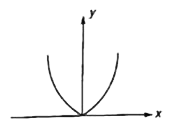One' is
prime number
composite number
Both (a) and (b)
Neither (a) nor (b)
The correct Answer is:D
To determine whether the number 1 is a prime number, composite number, or neither, we can follow these steps:
Step 1: Understand the definitions
- Prime Number: A prime number is defined as a natural number greater than 1 that has exactly two distinct positive divisors: 1 and itself.
- Composite Number: A composite number is a natural number greater than 1 that has more than two positive divisors.
Step 2: Analyze the number 1
- The number 1 has only one positive divisor, which is itself (1).
Step 3: Compare with definitions
- Since a prime number must have exactly two distinct positive divisors and a composite number must have more than two, we can see that:
- 1 does not meet the criteria for being a prime number (it has only one divisor).
- 1 does not meet the criteria for being a composite number (it does not have more than two divisors).
Step 4: Conclusion
- Therefore, the number 1 is neither a prime number nor a composite number.
Final Answer
- The correct classification for the number 1 is that it is neither prime nor composite.
---
- Prime Number: A prime number is defined as a natural number greater than 1 that has exactly two distinct positive divisors: 1 and itself.
- Composite Number: A composite number is a natural number greater than 1 that has more than two positive divisors.
- The number 1 has only one positive divisor, which is itself (1).
- Since a prime number must have exactly two distinct positive divisors and a composite number must have more than two, we can see that:
- 1 does not meet the criteria for being a prime number (it has only one divisor).
- 1 does not meet the criteria for being a composite number (it does not have more than two divisors).
- Therefore, the number 1 is neither a prime number nor a composite number.
- The correct classification for the number 1 is that it is neither prime nor composite.
Topper's Solved these Questions
- NUMBER SYSTEM BOOK - ADVANCED MATHS BY ABHINAY MATHS ENGLISHCHAPTER - NUMBER SYSTEM EXERCISE - MULTIPLE CHOICE QUESTIONS
225 Videos
- MOCK TEST IIBOOK - ADVANCED MATHS BY ABHINAY MATHS ENGLISHCHAPTER - MOCK TEST IIEXERCISE - MCQ
100 Videos
- PARTNERSHIPBOOK - ADVANCED MATHS BY ABHINAY MATHS ENGLISHCHAPTER - PARTNERSHIPEXERCISE - Questions
26 Videos
Similar Questions
Knowledge Check
Which ones is correct?
ASmaller substances diffuse fasterBHydrophilic substances cannot pass through the cell membrane due to lipid present in the cell membraneCDiffusion is rapid over short distance but extremely slow over long distanceDAllOne must keep one's promises.
AOne's promises must be kept by one.BOne's promises had to be kept.CPromises must be kept.DPromises have to be kept by one.One must keep one's promises.
AOne's promises are kept.BOne's promises must kept.COne's promises were kept.DPromises must be kept.
Show that if f:A→Band g:B→Care one-one, then gof:A→Cis also one-one.
View SolutionMark (a) if function is one - one and into Mark (b) if function is one - one but not into Mark (c) if function is neither one - one nor into Mark (d) if function is not one - one but into
f(x)=x2
f:R→R+∪{0}

View SolutionMark (a) if function is one - one and into
Mark (b) if function is one - one but not into
Mark (c) if function is neither one - one nor into
Mark (d) if function is not one - one but into
f(x)=x2
f:R→R

View SolutionMark (a) if function is one - one and into
Mark (b) if function is one - one and not into
Mark (c) if function is not one - one and into
Mark (d) if function is not one - one and not into
f(x)=x2
f:R+→R+

View SolutionMark (a) if function is one - one and into
Mark (b) if function is one - one and not into
Mark (c) if function is not one - one and into
Mark (d) if function is not one - one and not into
f(x)=x2
f:R+→R+

View Solution
